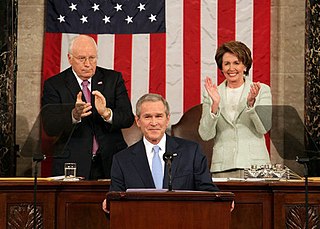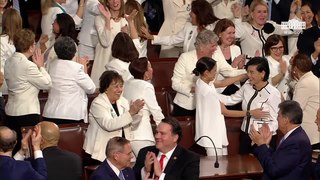
The State of the Union Address is an annual message delivered by the president of the United States to a joint session of the United States Congress near the beginning of most calendar years on the current condition of the nation. The State of the Union Address generally includes reports on the nation's budget, economy, news, agenda, progress, achievements and the president's priorities and legislative proposals.

A joint session of the United States Congress is a gathering of members of the two chambers of the bicameral legislature of the federal government of the United States: the Senate and the House of Representatives. Joint sessions can be held on any special occasion, but are required to be held when the president delivers a State of the Union address, when they gather to count and certify the votes of the Electoral College as the presidential election, or when they convene on the occasion of a presidential inauguration. A joint meeting is a ceremonial or formal occasion and does not perform any legislative function, and no resolution is proposed nor vote taken.

The 2007 State of the Union Address was given by the 43rd president of the United States, George W. Bush, on January 23, 2007, at 9:00 p.m. EST, in the chamber of the United States House of Representatives to the 110th United States Congress. It was Bush's sixth State of the Union Address and his seventh speech to a joint session of the United States Congress. Presiding over this joint session was the House speaker, Nancy Pelosi, accompanied by Dick Cheney, the vice president, in his capacity as the president of the Senate.

The 2008 State of the Union Address was given by the 43rd president of the United States, George W. Bush, on January 28, 2008, at 9:00 p.m. EST, in the chamber of the United States House of Representatives to the 110th United States Congress. It was Bush's seventh and final State of the Union Address and his eighth and final speech to a joint session of the United States Congress. Presiding over this joint session was the House speaker, Nancy Pelosi, accompanied by Dick Cheney, the vice president, in his capacity as the president of the Senate.

Barack Obama, the 44th president of the United States, addressed a joint session of the United States Congress on Tuesday, February 24, 2009. It was his first public address before a joint session. Similar to a State of the Union Address, it was delivered before the 111th United States Congress in the Chamber of the United States House of Representatives in the United States Capitol. Presiding over this joint session was the Speaker of the United States House of Representatives, Nancy Pelosi, accompanied by Joe Biden, the vice president in his capacity as the president of the Senate.

The 1994 State of the Union Address was given by the 42nd president of the United States, Bill Clinton, on January 25, 1994, at 9:00 p.m. EST, in the chamber of the United States House of Representatives to the 103rd United States Congress. It was Clinton's first State of the Union Address and his second speech to a joint session of the United States Congress. Presiding over this joint session was House speaker Tom Foley, accompanied by Vice President Al Gore, in his capacity as the president of the Senate.
In American politics, the response to the State of the Union address is a rebuttal speech, often brief, delivered by a representative of an opposition party following a presidential State of the Union address. When the president is a Democrat, the rebuttal is typically given by a Republican, and vice versa.

The 2011 State of the Union Address was given by the 44th president of the United States, Barack Obama, on January 25, 2011, at 9:00 p.m. EST, in the chamber of the United States House of Representatives to the 112th United States Congress. It was Obama's second State of the Union Address and his third speech to a joint session of the United States Congress. Presiding over this joint session was the House speaker, John Boehner, accompanied by Joe Biden, the vice president, in his capacity as the president of the Senate.

The 2014 State of the Union Address was given by the 44th president of the United States, Barack Obama, on January 28, 2014, at 9:00 p.m. EST, in the chamber of the United States House of Representatives to the 113th United States Congress. It was Obama's fifth State of the Union Address and his sixth speech to a joint session of the United States Congress. Presiding over this joint session was the House speaker, John Boehner, accompanied by Joe Biden, the vice president, in his capacity as the president of the Senate.

The 2015 State of the Union Address was given by the 44th president of the United States, Barack Obama, on January 20, 2015, at 9:00 p.m. EST, in the chamber of the United States House of Representatives to the 114th United States Congress. It was Obama's sixth State of the Union Address and his seventh speech to a joint session of the United States Congress. Presiding over this joint session was the House speaker, John Boehner, accompanied by Joe Biden, the vice president, in his capacity as the president of the Senate.

Donald Trump, the 45th president of the United States, addressed a joint session of the United States Congress on February 28, 2017. It was his first public address before a joint session. Similar to a State of the Union Address, it was delivered before the 115th United States Congress in the Chamber of the House of Representatives in the United States Capitol. Presiding over this joint session was the House speaker, Paul Ryan, accompanied by Mike Pence, the vice president in his capacity as the president of the Senate.

The 2019 State of the Union Address was given by the 45th president of the United States, Donald Trump, on February 5, 2019, at 9:00 p.m. EST, in the chamber of the United States House of Representatives to the 116th United States Congress. It was Trump's second State of the Union Address and his third speech to a joint session of the United States Congress. Presiding over this joint session was the House speaker, Nancy Pelosi, accompanied by Mike Pence, the vice president, in his capacity as the president of the Senate.

The 2020 State of the Union Address was given by the 45th president of the United States, Donald Trump, on February 4, 2020, at 9:00 p.m. EST, in the chamber of the United States House of Representatives to the 116th United States Congress. It was Trump's third and final State of the Union Address and his fourth and final speech to a joint session of the United States Congress. Presiding over this joint session was the House speaker, Nancy Pelosi, accompanied by Mike Pence, the vice president, in his capacity as the president of the Senate.
2020s in United States political history is a narrative summary of major political events and issues in the United States from January 1, 2020, through December 31, 2029. The first part is divided chronologically by Congressional sessions and the second part highlights major issues that span several years or even the entire decade. There are links for further information.

The George Floyd Justice in Policing Act of 2021 was a policing reform bill drafted by Democrats in the United States Congress. The legislation was introduced in the United States House of Representatives on February 24, 2021. The legislation aims to combat police misconduct, excessive force, and racial bias in policing.

The American Rescue Plan Act of 2021, also called the COVID-19 Stimulus Package or American Rescue Plan, is a US$1.9 trillion economic stimulus bill passed by the 117th United States Congress and signed into law by President Joe Biden on March 11, 2021, to speed up the country's recovery from the economic and health effects of the COVID-19 pandemic and recession. First proposed on January 14, 2021, the package builds upon many of the measures in the CARES Act from March 2020 and in the Consolidated Appropriations Act, 2021, from December.

Donald Trump's farewell address was the final official speech of Donald Trump as the 45th President of the United States, delivered as a recorded, online video message on January 19, 2021. The farewell address was delivered the day before Joe Biden, who defeated him in the 2020 United States presidential election, was sworn in as his successor. Trump was the first president to not attend his successor's inauguration since Andrew Johnson in 1869.

The Build Back Better Plan or Build Back Better agenda was a legislative framework proposed by U.S. president Joe Biden between 2020 and 2021. Generally viewed as ambitious in size and scope, it sought the largest nationwide public investment in social, infrastructural, and environmental programs since the 1930s Great Depression-era policies of the New Deal.

The Infrastructure Investment and Jobs Act (IIJA), most commonly known as the Bipartisan Infrastructure Law (BIL),, is a United States federal statute enacted by the 117th United States Congress and signed into law by President Joe Biden on November 15, 2021. It was originally introduced in the House as the INVEST in America Act, and was commonly known as the Bipartisan Infrastructure Bill before it was signed into law.

The 2022 State of the Union Address was given by the 46th president of the United States, Joe Biden, on March 1, 2022, at 9:00 p.m. EST, in the chamber of the United States House of Representatives to the 117th United States Congress. It was Biden's first State of the Union Address, and his second speech to a joint session of the United States Congress. Presiding over this joint session was the House speaker, Nancy Pelosi, accompanied by Kamala Harris, the vice president, in her capacity as the president of the Senate.


















